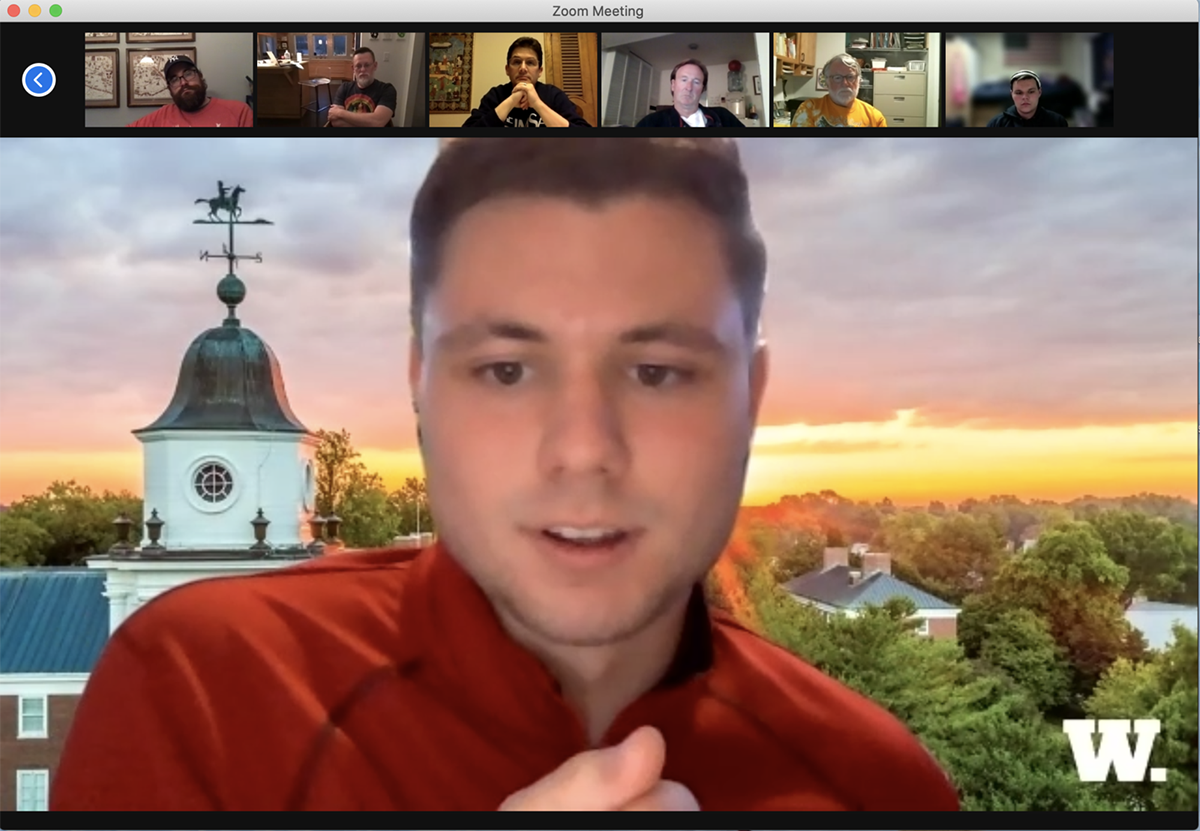After the nation experienced an especially divisive election followed by the Capitol Riots on January 6, Bryce McCullough ’23 felt a calling to do something.
“I remember watching the news and thinking, ‘We’ve got to do something about our divisions,’” said McCullough, a PPE major and Wabash Democracy and Public Discourse (WDPD) fellow.
“I’ve heard a lot of people say, ‘We need to unite as a country,’” he said. “But have we really ever been unified? What does unity look like? What can we do to achieve that unity?”
McCullough wanted to challenge others to think and have conversations about this theme.
 He reached out to WDPD Program Director Dr. Sara Drury and Program Associate Hayley Blonsley and pitched an idea that sought to restore civility and build unity, starting with the Wabash community. It would involve a short documentary screening and a two-part, interactive discussion about how we can learn and grow from our differences and come together across divides.
He reached out to WDPD Program Director Dr. Sara Drury and Program Associate Hayley Blonsley and pitched an idea that sought to restore civility and build unity, starting with the Wabash community. It would involve a short documentary screening and a two-part, interactive discussion about how we can learn and grow from our differences and come together across divides.
Around 80 people – a mix of students, faculty and staff, alumni, and Crawfordsville community members – virtually joined together Tuesday night and participated in WDPD’s event titled, “Purple: Acknowledging Complexity and Fostering Unity.”
Participants watched the documentary “PURPLE: America, We Need to Talk,” and participated in conversations facilitated by McCullough and other WDPD fellows. During these deliberations, they discussed polarization and how we – Wabash College, our communities, and nation – can come together moving forward.
“How are you feeling,” McCullough asked a small group of participants to begin the discussion. “What events or circumstances are weighing on you? What currently is in the back your mind when you think about this country right now?”
“For me, it’s sort of ambivalence,” one participant responded. “On one hand, I’m a little worried, concerned, and scared because of some of the things that are going on. On the other hand, I think we can get through this, and I hope that we do and we get back to the point where we have respect and love for each other.”
“I never thought I would experience pessimism regarding the state of the United States,” another reflected, “but it seems we can't agree upon a common set of facts, and it’s really difficult to have a dialogue about anything.”
“One of the hardest parts nowadays is that you have to be labeled by something – either you’re a Republican or Democrat or you’re on this side of this side. It's hard to be able to just say, ‘No. I'm an American, and it’s OK that we may have different beliefs,” McCullough said. “That’s what this should all be about – being able to put things aside civilly and say, ‘OK, let’s have this hard conversation, person to person.’”
.png) As the conversation continued, the group got personal and dove into difficult topics.
As the conversation continued, the group got personal and dove into difficult topics.
They shared their views, beliefs, and biases; talked about what factors in society contribute to and cause polarization; and brainstormed how to get people from different backgrounds to engage with each other, ultimately fostering unity.
Ideas on how to foster unity ranged from pushing others to value civil discourse to holding others accountable and following the “Gentleman's Rule.”
“We need to let students know that it’s OK to seek others out, and to not worry about cancel culture if their views are different,” one participant said. “It’s important to go out and ask questions like, ‘What is your experience? What was it like in your hometown? What is it like being of a different race, religion, economic-background?' People are willing to share their stories. We just have to listen.”
“The community – our civic groups, churches, even sport teams – has to get individuals in those communities to realize and believe in the importance of diversity,” another said. “It’s worthwhile to take the chance to work with other groups of people and break out of our comfort zones.”
WDPD members said Tuesday’s event can’t be a one-time-thing, and that the hope is for more discussions focusing on unity to take place on campus and in the community.
“Deliberative work requires deeply personal and difficult conversations about our communities,” Blonsley said. “I'm incredibly proud that our WDPD Fellows approach these issues as opportunities to bring people together and work towards collaborative change. WDPD gets to lead by example, showing the rest of the nation how we come together and work to continually improve.”